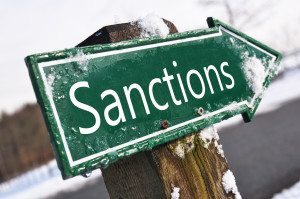The Federal Circuit on Friday affirmed a district court’s order imposing sanctions against a Colorado patent attorney and his patentee client for vexatious litigation. Doubling down, the Federal Circuit imposed its own sanctions for what it says was a frivolous appeal. See Walker v. Health International Corp., No. 15-1676 (Fed. Cir. Jan. 6, 2017). The CAFC’s ruling opens the door to a possible ethics inquiry of the patentee’s counsel by the USPTO’s Office of Enrollment and Discipline (OED).
This matter arose from a lawsuit filed by inventor Andre Walker in the District of Colorado in 2012 for infringement of U.S. Patent No. 7,090,627, relating to an abdominal exercise device. In May 2014, Walker and the last remaining defendant (HSN), both represented by counsel, engaged in mediation. That same day, they entered into a hand-written Mediated Settlement Agreement (“Agreement”). The Agreement required that HSN pay $200,000 to Walker within thirty days. Following payment of the $200,000, Walker became obligated to deliver a release to HSN and “by joint stipulation the parties to this agreement shall dismiss all claims between them with prejudice.”
On May 9, HSN filed a Motion to Stay Deadlines based on the Agreement and requested that all case deadlines be postponed for thirty days in order to effectuate the settlement. Walker opposed the motion, stating that HSN’s allegation that the Agreement resolved all claims was “simply incorrect.” Walker claimed that “there are significant issues that remain to be resolved, and which may require the filing of an amended complaint.”
On June 16, HSN filed a Motion for Sanctions based on Walker’s “meritless filings [that] forced [HSN] to continue to litigate this matter and waste resources on a matter that has been fully resolved” and moved for dismissal with the district court retaining jurisdiction over its request for attorneys’ fees. On August 4, 2014, the district court dismissed all claims and found “that Plaintiff’s actions have unnecessarily multiplied the proceedings at a time when the underlying claims have admittedly been resolved. These actions [were] not supported by any justifiable litigation strategy, particularly given Plaintiff’s current position that the case should be dismissed.” Walker, 2014 WL 3819487, at *3. In April 2015, the district court entered final judgment awarding HSN $20,511.50 in attorneys’ fees because Walker’s “litigation conduct after entering into the Agreement was vexatious and had unnecessarily multiplied the proceedings.”
On August 4, 2014, the district court dismissed all claims and found “that Plaintiff’s actions have unnecessarily multiplied the proceedings at a time when the underlying claims have admittedly been resolved. These actions [were] not supported by any justifiable litigation strategy, particularly given Plaintiff’s current position that the case should be dismissed.” Walker, 2014 WL 3819487, at *3. In April 2015, the district court entered final judgment awarding HSN $20,511.50 in attorneys’ fees because Walker’s “litigation conduct after entering into the Agreement was vexatious and had unnecessarily multiplied the proceedings.”
On appeal, the Federal Circuit affirmed. The CAFC explained that federal courts have the inherent, equitable power to “award attorneys’ fees when the interests of justice so require.” Hall v. Cole, 412 U.S. 1, 5 (1973). Such an award is within the court’s discretion when a party “has acted in bad faith, vexatiously, wantonly, or for oppressive reasons.” Id. Furthermore, Rule 38 of the Federal Rules of Appellate Procedure provides that “[i]f a court of appeals determines that an appeal is frivolous, it may, after a separately filed motion or notice from the court and reasonable opportunity to respond, award just damages and single or double costs to the appellee.”
The CAFC noted that an appeal can be frivolous as filed when “the judgment by the tribunal below was so plainly correct and the legal authority contrary to appellant’s position so clear that there really is no appealable issue.” State Indus., Inc. v. Mor-Flo Indus., Inc., 948 F.2d 1573, 1578 (Fed. Cir. 1991) (quoting Finch v. Hughes Aircraft Co., 926 F.2d 1574, 1579–80 (Fed. Cir. 1991)). In addition, an appeal is frivolous as argued when “the appellant’s misconduct in arguing the appeal” justifies such a holding. Id. (quoting Romala Corp. v. United States, 927 F.2d 1219, 1222 (Fed. Cir. 1991)). Such misconduct can include manufacturing arguments “by distorting the record, by disregarding or mischaracterizing the clear authority against its position, and by attempting to draw illogical deductions from the facts and the law.” Id. at 1579.
District Court Proceedings
The Federal Circuit first held that the district court properly exercised its discretion in sanctioning Walker and his counsel based on their conduct post-settlement. The CAFC stated that the Agreement unambiguously resolved “all claims” and clearly dismissed the suit with prejudice upon HSN’s payment of $200,000.
Walker further argued that reversal was warranted because the district court lacked authority to strike his Objection to the award of attorneys’ fees as untimely and the district court lacked jurisdiction. The Federal Circuit, however, found no merit to these arguments.
Proceedings on Appeal
On appeal, Walker argues that the award of fees was improper because he was the “prevailing party” in the lawsuit by compelling a “voluntary change” in HSN’s conduct. In support, Walker cited a Supreme Court case. The Federal Circuit, however, found that the case on which Walker relied “states the opposite of Walker’s position.”
In addition, the CAFC found that Walker raised new arguments in his Reply briefing “amounting to baseless accusations against opposing counsel.” The Federal Circuit stated Walker’s argument bent the rules to mischaracterize clear authority and to draw illogical conclusions from the law and facts. “As such, the positions taken by Walker on appeal in the briefs and at oral argument were frivolous.”
Finally, the Court stated that sanctions were necessary because
The filing of and proceeding with clearly frivolous appeals constitutes an unnecessary and unjustifiable burden on already overcrowded courts, diminishes the opportunity for careful, unpressured consideration of nonfrivolous appeals, and delays access to the courts of persons with truly deserving causes.” Asberry v. U.S. Postal Serv., 692 F.2d 1378, 1382 (Fed. Cir. 1982). Frivolous appeals waste both the public resources supplied to this court and the resources of prevailing litigants that must defend such frivolous actions. This appeal was frivolous as filed. The record lacks any support for Walker’s attempts to frustrate the comprehensive settlement by prolonging litigation.
The circuit court was particularly troubled by “Walker’s baseless assertions of misconduct against his opposing counsel and continued misrepresentation of clear, binding Supreme Court precedent even after the distortion was pointed out by opposing counsel. The continued misrepresentation standing alone is a very serious matter that could warrant sanctions. Attempts to mislead the court in a frivolous appeal further compound the wasted resources because the court and opposition are forced to devote extra resources to sorting through half-truths and misused legal authority in an appeal that never should have been filed in the first place.”
The Court affirmed the district court. It also awarded HSN’s attorney’s fees and double costs on appeal “because there was no reasonable basis for reversal and Walker’s arguments repeatedly distorted controlling law.”
What Dangers Lie Beneath?
The CAFC’s ruling may not be the end of the matter for plaintiff’s patent attorney. The USPTO’s Rules of Professional Conduct prohibit a practitioner from bringing or defending a proceeding, or asserting or controverting an issue, unless “there is a basis in law and fact for doing so that is not frivolous.” 37 C.F.R. Section 11.301. A practitioner also is required to make reasonable efforts to expedite proceedings before a tribunal. 37 C.F.R. Section 11.302.
The Office of Enrollment and Discipline (OED) is charged with investigating practitioners who may have violated one or more of the USPTO’s ethics rules. Walker’s litigation counsel is registered to practice in patent matters before the Office, and thus, he is subject to the USPTO’s disciplinary jurisdiction.
In past matters, including cases handled by the undersigned, the OED has instituted ethics investigations under 37 C.F.R. Section 11.22 for alleged litigation misconduct. The CAFC’s ruling today could provide fodder for the OED to open an inquiry into whether Walker’s counsel’s conduct may have violated any of the USPTO’s ethics rules.

Hey! Thanks a lot for telling us that we could simply prove a lawsuit to be frivolous by presenting credible evidence proving such motives. My boss was recently slapped with a legal action by one of our former clients who accused him of excessive profanity during a business transaction. I’ll remind him to seek professional assistance to fight the case immediately.